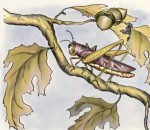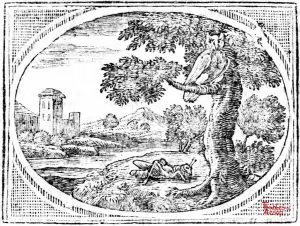A Grasshopper bothered an Owl trying to sleep. The more the Owl complained the louder the Grasshopper became. Owl solved the problem; Grasshopper eaten.
Don’t be unreasonable against greater force.

Aesop For Children
The Owl always takes her sleep during the day. Then after sundown, when the rosy light fades from the sky and the shadows rise slowly through the wood, out she comes ruffling and blinking from the old hollow tree. Now her weird “hoo-hoo-hoo-oo-oo” echoes through the quiet wood, and she begins her hunt for the bugs and beetles, frogs and mice she likes so well to eat.
Now there was a certain old Owl who had become very cross and hard to please as she grew older, especially if anything disturbed her daily slumbers. One warm summer afternoon as she dozed away in her den in the old oak tree, a Grasshopper nearby began a joyous but very raspy song. Out popped the old Owl’s head from the opening in the tree that served her both for door and for window.
“Get away from here, sir,” she said to the Grasshopper. “Have you no manners? You should at least respect my age and leave me to sleep in quiet!”
But the Grasshopper answered saucily that he had as much right to his place in the sun as the Owl had to her place in the old oak. Then he struck up a louder and still more rasping tune.
The wise old Owl knew quite well that it would do no good to argue with the Grasshopper, nor with anybody else for that matter. Besides, her eyes were not sharp enough by day to permit her to punish the Grasshopper as he deserved. So she laid aside all hard words and spoke very kindly to him.
“Well sir,” she said, “if I must stay awake, I am going to settle right down to enjoy your singing. Now that I think of it, I have a wonderful wine here, sent me from Olympus, of which I am told Apollo drinks before he sings to the high gods. Please come up and taste this delicious drink with me. I know it will make you sing like Apollo himself.”
The foolish Grasshopper was taken in by the Owl’s flattering words. Up he jumped to the Owl’s den, but as soon as he was near enough so the old Owl could see him clearly, she pounced upon him and ate him up.
Moral
Flattery is not a proof of true admiration.
Do not let flattery throw you off your guard against an enemy.

Townsend version
An owl, accustomed to feed at night and to sleep during the day, was greatly disturbed by the noise of a Grasshopper and earnestly besought her to stop chirping. The Grasshopper refused to desist, and chirped louder and louder the more the Owl entreated. When she saw that she could get no redress and that her words were despised, the Owl attacked the chatterer by a stratagem. “Since I cannot sleep,” she said, “on account of your song which, believe me, is sweet as the lyre of Apollo, I shall indulge myself in drinking some nectar which Pallas lately gave me. If you do not dislike it, come to me and we will drink it together.” The Grasshopper, who was thirsty, and pleased with the praise of her voice, eagerly flew up. The Owl came forth from her hollow, seized her, and put her to death.

Samuel Croxall
AN Owl sat sleeping in a tree. But a Grasshopper, who was singing beneath, would not let her be quiet, abusing her with very indecent and uncivil language; telling her she was a scandalous person, who plied a-nights to get her living, and shut herself up all day in a hollow tree. The Owl desired her to hold her tongue and be quiet: notwithstanding which, she was the more impertinent. She begged of her a second time to leave off; but all to no purpose. The Owl, vexed at the heart to find that all she said went for nothing, cast about to inveigle her by stratagem. Well, says she, since one must be kept awake, it is a pleasure, however, to be kept awake by so agreeable a voice; which, I must confess, is no ways inferior to the finest harp. And, now I think of it, I have a bottle of excellent nectar, which my mistress Pallas gave me; if you have a mind, I will give you a dram to wet your whistle. The Grasshopper, ready to die with thirst, and, at the same time, pleased to be so complimented upon account of her voice, skipped up to the place very briskly; when the Owl, advancing to meet her, seized, and without much delay, made her a sacrifice to her revenge; securing to herself, by the death of her enemy, a possession of that quiet, which, during her life-time, she could not enjoy.
THE APPLICATION
Humanity, or what we understand by common civility, is not more a necessary duty, than it is easy to practise. The man that is guilty of ill-manners, if he has been bred to know what is meant by manners, must do violence to himself, as well as to the person he offends; and cannot be inhuman to others, without being cruel to his own nature. It has been observed, in the application to the forty-seventh fable, that people of captious tempers being generally in the wrong, in taking things ill, which were never so intended, are likely to be but the more persecuted; in order to be laughed out of their folly; and that not unjustly. But we must take care to distinguish; and, when any thing truly impertinent and troublesome has been said or done to another, not to repeat it because he takes it ill, but immediately to desist from it; especially when he is so moderate as to make it his request two or three times, before he proceeds openly to take his course, and do himself justice. This point should be well considered; for many quarrels, of very ill consequence, have been occasioned by a rash unthinking persistance in the impertinent humour before-mentioned. Some young people are tend of showing their wit and intrepidity, and therefore take such occasions to do it: and when a friend is peevish, (as one may have a private cause for being so) they will not leave, till they have rallied him out of it; no, though he entreats them ever so gravely and earnestly. Whereas, in truth, we have no right to be impertinent with one another to extremity; and though there is no law to punish such incivilities as I have been speaking of, they will scarce fail of meeting with a deserved and just chastisement, some way or other.

JBR Collection
An Owl who was sitting in a hollow tree, dozing away a long summer’s afternoon, was very much disturbed by a rogue of a Grasshopper singing in the grass beneath. So far indeed from keeping quiet, or moving away at the request of the Owl, the Grasshopper sang all the more, and called her an old blinker that only showed out at nights when all honest people were gone to bed. T he Owl waited in silence for a short time, and then artfully addressed the Grasshopper as follows: “Well, my dear, if one cannot be allowed to sleep, it is something to be kept awake by such a pleasant little pipe as yours, which makes most agreeable music, I must say. And now I think of it, my mistress Pallas gave me the other day a bottle of delicious nectar. If you will take the trouble to come up, you shall have a drop, and it will clear your voice nicely.” The silly Grasshopper, beside himself with the flattery, came hopping up to the Owl. When he came within reach, the Owl caught him, killed him, and finished her nap in comfort.

Cicada et Noctua
Cicada acerbum convicium noctuae faciebat, quae solita est victum in tenebris quaerere et interdiu cavo ramo somnum capere. Cicada rogata est ut taceret, sed multo validius clamare occepit. Rursus admota prece, magis accensa est. Noctua, ut vidit sibi nullum auxilium esse et verba sua contemni, hac fallacia garrulam adgressa est: “Quia me dormire non sinunt cantus tui, quos putes citharam Apollinis sonare, mihi animus est nectar potare, quod Pallas nuper donavit. Si non fastidis, veni; una bibamus.” Cicada, quae siti arebat, simul vocem suam laudari gaudebat, cupide advolavit. Noctua, cavo obsepto, cicadam trepidantem consectata est et leto dedit. Sic, quod viva negarat, tribuit mortua.
Perry #507


